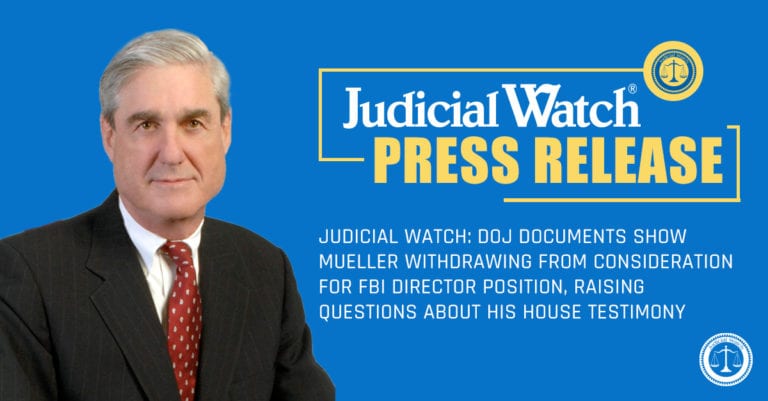

Judicial Watch: DOJ Documents Show Mueller Withdrawing from Consideration for FBI Director Position, Raising Questions about His House Testimony


(Washington, DC) – Judicial Watch announced today that it received 47 pages of documents from the Department of Justice which includes a May 17, 2017, email documenting that Robert Mueller informed the Attorney General’s office he was withdrawing from consideration for director of the FBI.
This recently released email raises new questions about Mueller’s testimony to the House Judiciary Committee on July 24, 2019, where he said a May 16, 2017 interview with President Donald Trump was “not about me applying for the job” as FBI director.
The emails were produced to Judicial Watch in response to its February 2, 2019, Freedom of Information Act (FOIA) lawsuit against the Department of Justice after for all records of communications of Deputy Attorney General Rod Rosenstein between May 8 and May 17, 2017 (Judicial Watch v. U.S. Department of Justice (No. 1:19-cv-00481)).
In the May 17, 2017, email former Deputy Attorney General Rosenstein writes to then-Assistant Attorney General Jody Hunt with the subject line: “Mueller” and states: “Withdrew from consideration for FBI director.”
Hunt responds: “[redacted] called this morning and also withdrew his name from consideration.”
On the same day, Rosenstein appointed Mueller special counsel for the Russia investigation.
On July 24, 2019, Mueller, testified about whether he was interviewed for the FBI Director position in an exchange with Rep. Greg Steube (R-FL):
STEUBE: Thank you, Mr. Chair. Mr. Mueller, over here. Mr. Mueller did you indeed interview for the FBI director job one day before you were appointed as Special Counsel?
MUELLER: My understanding I was not applying for that job, I was asked to give my input on what it would take to do the job, which triggered the interview you’re talking about.
STEUBE: So you don’t recall on May 16th, 2017 that you interviewed with the president regarding the FBI director job?
MUELLER: I interviewed with the president and it was about…
STEUBE: Regarding the FBI director job?
MUELLER: …it was about the job and not about me applying for the job.
STEUBE: So your statement here today is that you didn’t interview to apply for the FBI director job?
MUELLER: That’s correct.
STEUBE: So it – did you tell the vice president that the FBI director position would be the one job that you would come back to – for?
MUELLER: I don’t recall that one.
STEUBE: You don’t recall that?
MUELLER: No.
President Trump said that Mueller did indeed “apply and interview” for the FBI director job and that claims otherwise presented a conflict of interest that should have kept him out of the Russia investigation.
The president tweeted on July 24, 2019, the day of Mueller’s House testimony: “It has been reported that Robert Mueller is saying that he did not apply and interview for the job of FBI Director (and get turned down) the day before he was wrongfully appointed Special Counsel. Hope he doesn’t say that under oath in that we have numerous witnesses to the interview, including the Vice President of the United States!”
The latest production of documents from the DOJ also includes a letter dated May 19, 2017, from Sen. Dianne Feinstein (D-CA) to President Trump in which the senator recommends Deputy Director Andrew McCabe for the director’s position at the bureau.
Feinstein writes that McCabe “has demonstrated leadership and excellence while engaged in some of the most high-profile and complex cases.”
Feinstein goes on to conclude: “During my time on both the Senate Intelligence Committee and the Senate Judiciary Committee, I have been impressed by Mr. McCabe and believe him to be a man of honor. He is exactly the kind of person we need leading the FBI right now, and I hope you give him strong consideration.”
DOJ Inspector General Michael Horowitz released a report in 2018 detailing multiple instances in which McCabe “lacked candor” with FBI Director James Comey, FBI investigators, and inspector general investigators about his authorization to leak sensitive information to the Wall Street Journal that revealed the existence of an FBI investigation into the Clinton Foundation.
On March 16, 2018, McCabe was fired by then-Attorney General Jeff Sessions.
After stonewalling on Judicial Watch’s FOIA requests for years, the FBI in late July agreed to release McCabe’s text messages, though have yet to release any of them.
“The corrupted Justice Department and FBI inexcusably hid these and other smoking gun records about Mueller and Rosenstein for nearly three years,” said Judicial Watch President Tom Fitton. “It is well past time for a serious independent investigation of Mueller and his abusive special counsel operation.”
In February 2020, Judicial Watch uncovered Rosenstein’s communications with former Obama officials, such as Eric Holder, as well as information sharing with the media in the days immediately surrounding the inception of the Mueller investigation.
In October 2019, Judicial Watch, through this same lawsuit, uncovered Rosenstein’s communications from this lawsuit that included a one-line email Mueller stating: “The boss and his staff do not know about our discussions,” as well as “off the record” emails with major media outlets around the date of Mueller’s appointment.
In September 2019, through a separate lawsuit, Judicial Watch uncovered records from the Department of Justice showing officials’ efforts in responding to media inquiries about DOJ/FBI talks allegedly invoking the 25th Amendment to “remove” President Donald Trump from office and Rosenstein offering to wear a “wire” to record his conversations with the president. Later that month, Judicial Watch uncovered a two-page memo, dated May 16, 2017, by then-Acting FBI Director Andrew McCabe detailing how Rosenstein proposed wearing a wire into the Oval Office “to collect additional evidence on the president’s true intentions.” McCabe wrote that Rosenstein said he thought it was possible because “he was not searched when he entered the White House.”
###















